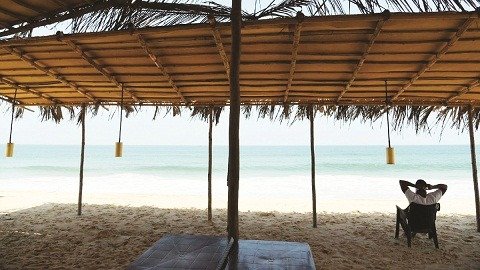
As the second wave subsides and Goa opens up for tourism, stakeholders and organisations put forth their views to the Government
Before covid-19, travel and tourism had become one of the most important sectors in the world economy, accounting for 10 percent of global GDP and more than 320 million jobs worldwide, and in a tourism dependent State like Goa, it has been the mainstay of the economy.
The State will feel the negative impacts of the crisis for much longer than other economies. Contact–intensive services which are key to the tourism and travel sectors are disproportionately affected by the pandemic and will continue to struggle until people feel safe to travel en masse again.

Ralph de Sousa, President of Goa Chamber of Commerce & Industry (GCCI) elaborates on the effect of the pandemic, both the first and second waves, on the tourism industry. “Tourism deals with people and this makes it the most sensitive industry – any dips upheavals or calamities, have a toll on the sensitive tourism industry. Historically, we know that any crises whether international, national or local, tourism is first to be affected and last to recover. The stress on tourism is felt right down to the common person in the primary sector via the multiplier effect. Tourism and the supply chain is a partnership of sorts where you swim or sink together. The players are many, may be in form of hoteliers, tour operators, travel agents, shack owners, water sports operators, taxi drivers, shop owners and many many more. They all get affected if tourism is facing a downturn and this is exactly what is happening in Goa. With half of its population directly or indirectly dependant on tourism, this pandemic has adversely affected the livelihoods of all of them and across the board, as tourism is shut for last year and a half due to the pandemic.”
Supriya Rane, Executive Director, La Cabana Resort, is of a similar opinion. “Covid-19 has severely impacted the tourism industry globally covering other industries like hospitality, travel agencies, tour operators, taxi operators and others. Both the hospitality and tourism industry in Goa have been impacted because of the covid-19 unprecedented challenges thus affecting economic growth and revenue. The decision to shutdown public places, hotels, flights and travel was taken to safeguard the health of the people. Many have shut down for good, as they could not sustain. Some have become bankrupt. The global travel industry is down with only domestic travel allowed within certain countries. However, there is hope now as the tourism season is on and knocking on Goa’s doors.”
Jack Ajit Sukhija, Partner, Panjim Inn and Chairman of GCCI’s Tourism Committee, said that the pandemic was devastating for the majority in the State. “Out of the 4000 odd hotels we have in Goa, only 1400 are open. Service providers, which are an integral part of tourism like taxi drivers, musicians, event organisers, boat cruises, tour operators, and the like, have suffered.”
Measures for revival of tourism
The Confederation of Indian Industry (CII) has listed various measures that the government and the Centre need to take for the revival of the travel and tourism sector in the State. First and foremost among the suggestions are, introduction of vaccine passports, incentives to boost domestic travel, improvement of the healthcare infrastructure and tax sops.
Ralph de Sousa is of the opinion that even though tourism needs to be opened to revive the economy, it has to be done carefully, cautiously and in a phased manner. “Human life is more important than economic gains and hence the government has to ensure that first all the locals are vaccinated, those who enter the State come with a vaccination certificate or a covid negative certificate. The protocols like restrictions on crowded parties and events should be implemented strictly. The numbers, as well the working hours, can be restricted if need be to ensure that the areas that lead to infections are properly addressed.
In case of any unfortunate eventuality, the required arrangements at the health centers, district hospitals or GMC, and other private hospitals should be in place. The arrangements and the standards should be of a level that will help curtail, control and cure any infections that might surface. The locals, as well as the tourists, have to be taken care of.”

Jack Sukhija says, “One must have taken both the doses of the vaccine or have an ICMR test done at least 48 hours arrival in the State.” In a report submitted to the State government and the Centre, the CII has said that these policy decisions will not only benefit domestic tourism but will also encourage inbound tourism. “The travel and tourism sector can benefit immensely from vaccine passports. India should create a system of vaccine passports to allow fully vaccinated people and those who have recovered from covid-19 in the past 90 days to travel freely without any requirements for testing across India,” CII has said in its report.
Given that India can track all the vaccinated people through the CoWIN or Aarogya Setu app and also verify the vaccination certificates issued in India, all states should come on board to permit seamless travel, said CII.
Supriya Rane states that the Government has a crucial role to play in the revival and growth of the tourism industry. “The tourism industry in Goa thrives on international and domestic travelers. Immediate relief measures by way of reduction of visa fees, relief in GST, giving additional tax holiday to tour operators and travel agents for a specified period to safeguard their interest are some options. The Tourism Board should have professionals from the industry with a proven record of accomplishment. Focussed campaign, tourism expo, and online platforms to market Goa within India and overseas can bring in quality tourist, who will add revenue and help restore lost jobs in the industry.”
In terms of incentives, CII has recommended that a tax exemption of `50,000 should be given to all employees who spend three times the amount on hotel accommodation, airfare or tour packages. The other option, would be to allow a deduction of `1 lakh under Chapter VI of Income Tax Act for travel.
The second wave has done great harm to India and Goa’s image as a safe destination for travelers. The State and the Centre need to strengthen the healthcare infrastructure to inspire confidence among tourists. “The government should announce a timetable, for opening visas and e-visas to allow the international tourists to plan their visits to India. The intervention should be taken up on an urgent basis, so as to not miss the coming winter season of travel,” said CII.
CII has also said that one-year GST exemption to travel and tourism would allow service providers to reduce pricing which in turn would attract international as well as domestic tourists.
Measures to be taken by Stakeholders
Along with the Government, stakeholders of the industry too, need to do their bit in helping revive this sector.
Ralph says that all stakeholders have a role to play in this regard. “They have to ensure that all their staff are fully vaccinated and in case there are any symptoms similar to those in covid infected patients, they should be immediately isolated and tested, so that any chances of contagion is nipped in the bud and treated right at the beginning. The players have to tighten their belts and run their businesses at less than full capacity, thus creating enough space for distancing the guests in common areas and restaurants to minimise any contagion through contact. A few rooms isolated from the main area in your hotel should be kept reserved for the guests who show any symptoms of covid. This will help to isolate potential infected guests from the others staying at the hotel. All information, help lines to reach the health authorities at the earliest should be kept ready at the receptions of all the hotels and other tourism related organisations.”

Supriya says that one should be prepared to quickly respond to the changes in business processes and operating hours. “Providing discounts to suppliers on supplies, rent while offering guests different options for cancellation to retain customers in the long term. Use this time to train your employees, try new ideas and look for new opportunities.”
While flexible policy solutions are needed to enable the tourism economy to live alongside the virus, in the short to medium term, it is important to look beyond this and take steps to learn from the crisis, which has revealed gaps in government and industry preparedness and response capacity. Co-ordinated action across governments at all levels and the private sector is essential.
The crisis is an opportunity to rethink tourism for the future. Tourism is at crossroads and the measures put in place today will shape the tourism of tomorrow.
Governments need to consider the long term implications of the crisis, while capitalising on certain aspects inorder to build a stronger, more sustainable and resilient tourism economy.
Michael Lobo Seeks Relief for Tourism Industry
Goa’s Minister of Ports and Solid Waste Management, Michael Lobo sought relief for Goa’s tourism business in paying back their loans and seeking that no account would be declared as a non- performing asset (NPA) during the ongoing wave of the pandemic.

Lobo, MLA of Calangute, which is the main attraction of Goa’s tourism industry, stated that he had written to the Union Finance Minister and the Prime Minister on behalf of beach shacks and restaurant owners, taxi operators, car and bike rental operators and other tourism businesses; who he said, were not in a position to pay back their installments until their businesses could resume.
“I also have a business and I am getting calls from banks from which I have taken loans. A manager of a bank told me that if I do not pay my loan instalment, it would be declared a NPA. Once it is declared an NPA then the process of recovery is initiated. If a bank manager can call me and inform me that my account will be declared as an NPA, what about the common man? What about people who live hand-to-mouth and run small businesses? How will they pay installments? This is an issue which is plaguing people in Goa as well as the rest of India,” said Lobo
Lobo further said that he would be writing to the Prime Minister and Finance Minister that the RBI should issue a circular to all nationalised banks that no account be declared as an NPA during the second wave of the pandemic. He also pointed out that from February onwards, the ones most affected were the small businesses, as they have not been open and were not in a position to pay installments.
Goa Tourism Development Corporation (GTDC) had conducted a state-wide survey through a consultant KPMG to understand the impact of the first wave of Covid-19 and lockdown on the Goa Tourism Industry. As per the survey, the overall loss of earnings in the tourism industry during lockdown has been estimated at `2,062 crores. Potential loss of earning for the 2020-21 season has been pegged at `7,239 crores and the potential job cuts were to the tune of 1.22 lakh (58%). The second wave is expected to erase a similar amount of value from the industry.
Goa’s tourism sector is a big source of revenue for the State with the industry directly contributing 16.43% towards the state Gross Domestic Product (GDP) and also provides employment to nearly 35% of the State’s population that is dependent on the sector, according to official estimates.





